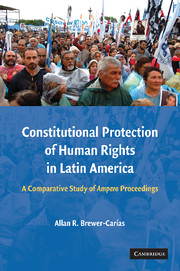 Constitutional Protection of Human Rights in Latin America
Constitutional Protection of Human Rights in Latin America Book contents
- Frontmatter
- Contents
- INTRODUCTION
- PART ONE THE CONSTITUTIONAL AND INTERNATIONAL DECLARATION OF HUMAN RIGHTS AND ITS JUDICIAL GUARANTIES
- PART TWO THE AMPARO AS A LATIN AMERICAN CONSTITUTIONAL AND INTERNATIONAL LAW INSTITUTION
- PART THREE THE INJURED PARTY AND THE CONSTITUTIONAL RIGHTS PROTECTED BY MEANS OF THE AMPARO PROCEEDING
- PART FOUR THE INJURY, THE INJURING PARTY AND THE INJURING ACTS OR OMISSIONS IN THE AMPARO PROCEEDING
- Chapter Twelve The General Conditions of the Injury (Harms and Threats)
- Chapter Thirteen The Reparable Character of the Harms and the Restorative Character of the Amparo Proceeding
- Chapter Fourteen The Imminent Character of the Threats and the Preventive Character of the Amparo Proceeding
- Chapter Fourteen The Injuring Party: The Defendant (Public Entities or Private Individuals)
- Chapter Sixteen The Injuring Public Actions and Omissions of Public Authorities Causing the Harms or the Threats
- PART FIVE THE EXTRAORDINARY CHARACTER OF THE AMPARO PROCEEDING
- CONCLUSION
- APPENDIX A List of Latin American Constitutions
- APPENDIX B List of Latin American Amparo Laws (Statutes)
- INDEX
Chapter Fourteen - The Imminent Character of the Threats and the Preventive Character of the Amparo Proceeding
Published online by Cambridge University Press: 08 August 2009
- Frontmatter
- Contents
- INTRODUCTION
- PART ONE THE CONSTITUTIONAL AND INTERNATIONAL DECLARATION OF HUMAN RIGHTS AND ITS JUDICIAL GUARANTIES
- PART TWO THE AMPARO AS A LATIN AMERICAN CONSTITUTIONAL AND INTERNATIONAL LAW INSTITUTION
- PART THREE THE INJURED PARTY AND THE CONSTITUTIONAL RIGHTS PROTECTED BY MEANS OF THE AMPARO PROCEEDING
- PART FOUR THE INJURY, THE INJURING PARTY AND THE INJURING ACTS OR OMISSIONS IN THE AMPARO PROCEEDING
- Chapter Twelve The General Conditions of the Injury (Harms and Threats)
- Chapter Thirteen The Reparable Character of the Harms and the Restorative Character of the Amparo Proceeding
- Chapter Fourteen The Imminent Character of the Threats and the Preventive Character of the Amparo Proceeding
- Chapter Fourteen The Injuring Party: The Defendant (Public Entities or Private Individuals)
- Chapter Sixteen The Injuring Public Actions and Omissions of Public Authorities Causing the Harms or the Threats
- PART FIVE THE EXTRAORDINARY CHARACTER OF THE AMPARO PROCEEDING
- CONCLUSION
- APPENDIX A List of Latin American Constitutions
- APPENDIX B List of Latin American Amparo Laws (Statutes)
- INDEX
Summary
THE PREVENTIVE CHARACTER OF THE AMPARO AGAINST THREATS
However, the amparo proceeding is not only a judicial mean seeking to restore harmed constitutional rights, it is also a judicial mean established for the protection of such rights against illegitimate threats that violate those rights.
It is in these cases that the amparo proceeding has a preventive character in the sense of avoiding harm, similar to the United States preventive civil rights injunctions seeking “to prohibit some act or series of acts from occurring in the future,” and designed “to avoid future harm to a party by prohibiting or mandating certain behavior by another party.”
It would be absurd for the affected party, when having complete knowledge of the near occurrence of a harm, to patiently wait for the harming act to be issued with all its consequences in order to file the amparo action. On the contrary, it has the right to file the action to obtain a judicial order prohibiting the action to be accomplished, thus avoiding the harm to occur.
The main condition for this possibility of filing amparo actions against threats (amenaza) to constitutional rights, as it is expressly provided in the Nicaraguan (Articles 51, 57, 79) Peruvian (Article 2) and Venezuelan (Articles 2; 6,2) Amparo Laws, is that they must be real, certain, immediate, imminent, possible and realizable.
- Type
- Chapter
- Information
- Constitutional Protection of Human Rights in Latin AmericaA Comparative Study of Amparo Proceedings, pp. 283 - 288Publisher: Cambridge University PressPrint publication year: 2008
